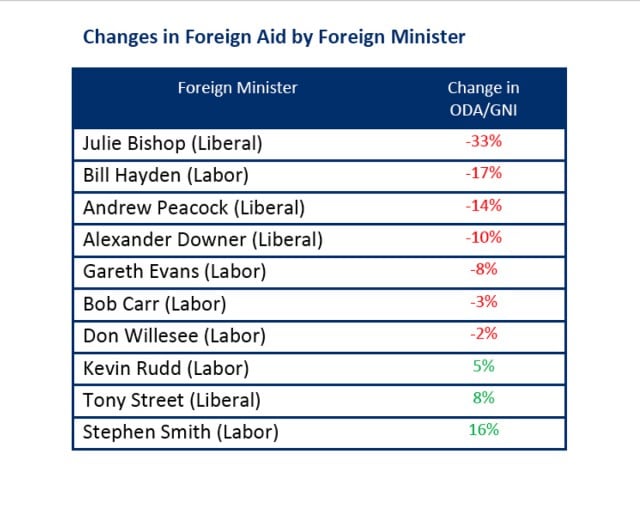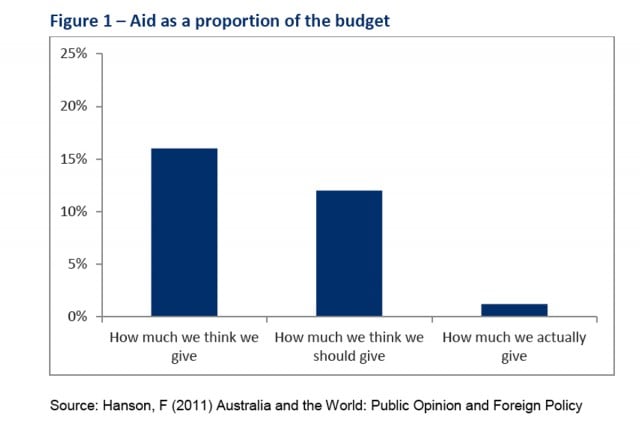
Charity ends at home: the decline of foreign aid in Australia
Matt Grundoff and Dan Gilchrist, The Australia Institute
Australia is one of the richest nations in the world, at arguably the richest point in our history. Yet our commitment to foreign aid is declining. The Coalition government plans to cut aid funding by $1.4 billion per year or 33 per cent by 2017-18.
To put our aid budget in perspective, however, we need to consider it as a portion of our Gross National Income (GNI). This allows us to measure how generous we are and compare our current aid budget with previous years and other countries.
By this measure, our aid budget has hit its lowest level since 1974, when our official overseas development assistance (ODA) program began. In 1974 we allocated 0.45 per cent of our income to aid, now it is just 0.22 per cent. Long gone is the Howard era bipartisan support for the Millennium Development Goals, and a target of 0.7 per cent of ODA/GNI.
Since 1974 there have been ten foreign ministers. The recent cuts give current foreign minister Julie Bishop the dubious honour of being the minister to oversee the largest drop in aid spending to GNI.
Minister Bishop had plenty of competition for this title. Six of her predecessors oversaw a decline in the aid budget relative to GNI, but none came close to her new record, as shown below:
 Worse still, minister Bishop’s cuts were not made strategically. Rather than cutting underperforming programs and focusing on successful ones, an across-the-board cut of 40 per cent has been made to 25 aid programs. These include country specific programs such as Indonesia and Afghanistan as well as regional and multilateral aid programs, such as UNICEF and the World Health Organisation (WHO).
Worse still, minister Bishop’s cuts were not made strategically. Rather than cutting underperforming programs and focusing on successful ones, an across-the-board cut of 40 per cent has been made to 25 aid programs. These include country specific programs such as Indonesia and Afghanistan as well as regional and multilateral aid programs, such as UNICEF and the World Health Organisation (WHO).
With Minister Bishop’s reappointment as foreign minister in the Turnbull cabinet, she has an opportunity to boost our aid budget and avoid being remembered as Australia’s stingiest foreign minister.
A sorry history of Australia’s declining foreign aid
Australia’s foreign aid program has undergone many makeovers. Founded in 1974 under the Whitlam government as the Australian Development Assistance Agency, it changed names several times before becoming known as AusAID. Despite the changing name, one thing remained perennial – funding cuts.
In some ways this is easy to understand. The people who lose out from cuts to our aid program are poor; they live in other countries and do not vote in Australia. They have little ability to influence Australian governments, politicians or the public.
Cuts to the aid budget have been popular with a majority of Australians. In 2015, 53 per cent of respondents to a Lowy Institute poll supported aid cuts while only 35 per cent were opposed.[1] However, a 2011 poll also by the Lowy Institute showed a surprising result: Australians think we give ten times more in aid than we actually give, as shown in Figure 1 below:[2]
When respondents were asked what proportion of the Federal Budget is spent on aid, the average response was 16 per cent. When respondents were asked what we should be spending, the average answer was 12 per cent. We actually spent 1.22 per cent in 2013-14, and are projected to spend 1.13 per cent in 2017-18.
Given that in the 2011 Lowy Institute Poll more than 70 per cent of Australians believe that we spend 5 per cent or more of the Federal Budget on aid, it is hardly surprising that cuts to aid are popular. But if the government were to give as much aid as people think we should, we would need to increase our aid budget almost tenfold.
Despite the apparent popularity of cuts to foreign aid, current foreign minister Julie Bishop made a pledge to the development community in January 2014:
… what I have done is stabilised the budget at $5 billion per annum. It will increase in line with inflation, so it will go up by CPI. This will provide certainty, predictability of funding for our partners, for the recipients and will put the aid budget on sustainable financial footing.
As late as October 2014, Julie Bishop said, “We will abide by the commitments we made in relation to foreign aid.] In December of the same year, just two months later, the government announced the biggest cuts to aid in Australia’s history.
The aid budget is now expected to drop to a low of $3.3 billion in 2015-16, far below the promised $5 billion stabilisation point.
As the Australian Council for International Development’s Federal Budget Analysis stated:
For much of the past year, sustained upheaval in the aid program has hampered aid programming decisions. … Uncertainty around funding to aid delivery partners, particularly Australian NGOs, has curtailed their ability to make decisions about their own programs. … This has had a real impact on vulnerable people, communities and partner organisations in developing countries who are assisted by Australia’s aid program. The deep cuts to aid confirmed in this Budget will further exacerbate this hardship.
While the current government’s cuts to the aid budget are considerable in nominal terms, it is more useful to consider them in terms of the percentage of GNI we are giving to foreign aid. This allows for comparison with earlier Australian governments and the aid budgets of other countries.
The above article is an extract from the report of the same name, by The Australia Institute and is reproduced with permission. The full report can be downloaded here.





People can’t rely on handouts. Australia is in major debt and needs to stop getting those handouts ourselves!
Countries need education, common moral code, hard work, innovation, conservation and security. Not handouts. And where do the handouts go to? The poor and suffering? Or greed and stupidity?
The answer is intelligence, leadership and work. Stop trying to solve other people’s problems. If they wanted to get better they would listen to wisdom.
Can you arm them? USA arms the enemies of the civilians and more civilians get slaughtered so, stop trying to fix other people’s problems. If they wanted to change from Sadam Hussein it would have changed on its own, no empire lasts forever. Sadam was bad but more of a tumble weed in comparison to the ISIS tornado.